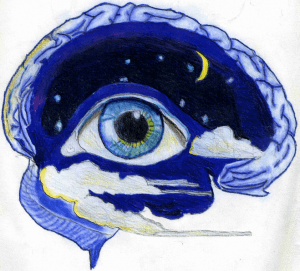 If I were to tell you that on an emergency scene it is possible for you to use X-Ray vision, you’d probably think I’ve been watching too many Superman movies. But it is possible for you to look right through a solid object on an emergency scene and see what’s beyond it. Seriously! Read on…
If I were to tell you that on an emergency scene it is possible for you to use X-Ray vision, you’d probably think I’ve been watching too many Superman movies. But it is possible for you to look right through a solid object on an emergency scene and see what’s beyond it. Seriously! Read on…
Looking through walls

Can you really look through a wall? Well, from the perspective of how your eyes see – by processing photons of light through the retina – the technical answer is NO. But, from the perspective of how the visual processor in your brain can allow you to form visual images of what your brain THINKS is on the other side of the wall, the answer is most definitely YES!
I have demonstrated this amazing phenomenon to first responders hundreds of times in exercises I have conducted during the Mental Management of Emergencies program. It’s unnerving when a participant tells the entire class he or she saw something that really wasn’t present. The participant THINKS they saw it. But in actuality, they didn’t. The participant actually hallucinated the image. But the imagined visual image appeared to be so real, the participant didn’t know the difference.
Your imagination at work
 As humans we have the gift of a very complex memory system. This allows you to remember things like the name of your first grade teacher and what you had for dinner last night and a whole lot in between. Your memory also allows you to have a vivid imagination. Humans have an uncanny ability to perceive visual, audible or other sensations like no other creature on earth. Imagination isn’t a bad thing.
As humans we have the gift of a very complex memory system. This allows you to remember things like the name of your first grade teacher and what you had for dinner last night and a whole lot in between. Your memory also allows you to have a vivid imagination. Humans have an uncanny ability to perceive visual, audible or other sensations like no other creature on earth. Imagination isn’t a bad thing.
It helps you make sense of the world in the absence of facts and data. Imagination is actually an essential component to the development of Level 3 situational awareness – your ability to predict future events. Imagination is also beneficial as commanders attempt to make sense of what is happening inside a structure while they are on the outside.
Your mind’s eye
 Imagined images are seen with your mind’s eye, which is to say they are formed in the same visual cortex as photons of light that enter through your eye. Information, in the form of photons of light create the clues and cues you process in your visual cortex to form a partial perception of reality – with emphasis on partial. Almost everything you perceive in life is only partially real. The rest is imagined.
Imagined images are seen with your mind’s eye, which is to say they are formed in the same visual cortex as photons of light that enter through your eye. Information, in the form of photons of light create the clues and cues you process in your visual cortex to form a partial perception of reality – with emphasis on partial. Almost everything you perceive in life is only partially real. The rest is imagined.
The good news is: Your brain is pretty good at figuring it all out and making sense of your senseless world. It has millions of years of practice. As you receive reports of conditions inside a building, your mind forms visual images of what it thinks the interior conditions look like. Experience and training aids the accuracy of the imagination. But it doesn’t guarantee the perception will, indeed, be reality. Your brain can play some real tricks on you, especially under stress.
Rich Gasaway’ Advice

It’s important to realize that not everything you see is, indeed, reality. I know it’s a hard concept to swallow. We don’t like to think we hallucinate. And we especially want to think that our perceptions are accurate, especially when the well-being of responders depend on it.
The bad news and good news is: Perceptions formed by imagination is likely to be different for each person. This means two people may look at something and see different things or hear something and understand the meaning differently. These differences can be both bad and good depending on the context of the situation. In an incident management scenario where members of a command team are comparing and contrasting their understanding of what is happening, the differences in perception may readily become evident.
This can be enhanced when command team members ask each other what they think is going on in areas of the incident scene that cannot be visualized. Differences in perceptions mean differences in imaginations. It’s difficult to tell who’s perception is more accurate until after the incident is complete and facts are able to be validated. In the meantime, differences should be discussed and a common perception should be developed.
Action Plan
 1. Discuss a time when your perception of reality was something different than reality. How did you become aware there was a problem? How were you able to resolve the differences?
1. Discuss a time when your perception of reality was something different than reality. How did you become aware there was a problem? How were you able to resolve the differences?
2. If your perception of reality is different than a fellow responder, discuss how the two of you could resolve your differences and develop a common perception of reality.
3. Go to YouTube and watch a short video (It doesn’t have to be of an emergency incident). Explain to a fellow responder what the video was about. Then have them write an explanation of the video. Compare their imagined perception of the video with the actual video. Did they leave out any details? Did they add any details the did not really exist in the video? Discuss the role imagination played in forming their perception of reality.
_____________________________________________________

If you are interested in taking your understanding of situational awareness and high-risk decision making to a higher level, check out the Situational Awareness Matters Online Academy.
CLICK HERE for details, enrollment options and pricing.
__________________________________
Share your comments on this article in the “Leave a Reply” box below. If you want to send me incident pictures, videos or have an idea you’d like me to research and write about, contact me. I really enjoy getting feedback and supportive messages from fellow first responders. It gives me the energy to work harder for you.
Thanks,

Email: Support@RichGasaway.com
Phone: 612-548-4424
SAMatters Online Academy
Facebook Fan Page: www.facebook.com/SAMatters
Twitter: @SAMatters
LinkedIn: Rich Gasaway
YouTube: SAMattersTV
iTunes: SAMatters Radio

Pingback: Situational Awareness Survey | Situational Awareness Matters!™Situational Awareness Matters!™